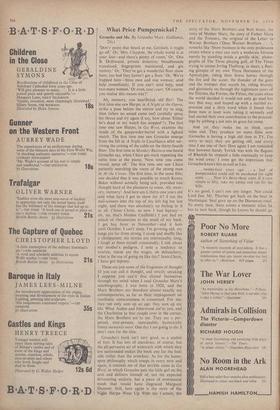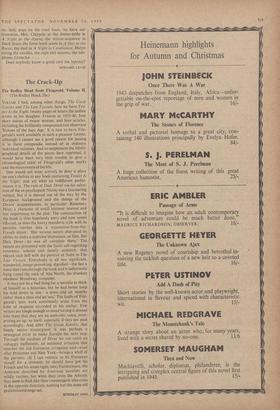What Price Pumpernickel?
'DON' r point that beard at me, Gottlieb, it might go off.' Or, 'Mrs. Claypole, the whole world is at your feet—and there's plenty of room.' Or, 'Otis B. Driftwood, private detective; bloodhounds transfused, fingerprints manicured, and gin rummy.' Or, 'They've got a wonderful floor show here; too bad they haven't got a floor.' Or, 'We're trapped here—three men and one woman; send help immediately. If you can't send help, send two more women.' Or even, tout court, 'Of course, you realise this means war?'
Ah, memory, you heartbreak old flirt! The first time one saw Harpo, in A Night at the Opera, strike a pose before the mirror and try to sing, then (when no sound came out) carefully spray his throat and try again (I say, how about 'Either he's dead or my watch has stopped'?). The first time one saw Harpo, in Go West, examine the inside of the gunpowder-barrel with a lighted match. The first time one saw Groucho emerge' from the lift in A Night in Casablanca after sur- viving the cutting of the cable on the thirty-fourth floor. The first time in Monkey Business one heard Groucho say, when Chico got stuck repeating the same tune at the piano, 'Next time you come round, jump off.' The first time one saw Chico patiently searching the room of the strong man in At the Circus. The first time, in the same film, one decided that it was possible to watch Kenny Baker without actually being sick, provided one thought hard of the pleasures to come. Ah, mem- ory, memory ! And here am I, thirty-one years old and what have I got to show for it? 1 ran the nail-scissors into the top of my left big toe last night, and there was absolutely no feeling in it at all. (Jesus Christ, so now I had leprosy'— oh, no, that's Holden Caulfield.) I just had an attack of rheumatism in the small of my back. I get hay fever in November—and it lasts until October. I can't sleep. I'm growing old, my lungs are far from strong, I stoop and shuffle like a chimpanzee, my stories are interminably long, laugh at them myself consumedly, I talk about my mother's pedigree, I note a tendency to avarice, THESE are thy wages, oh debauchery, what is the use of going on like this? Jesus Christ, I have got leprosy.
These are just some of the fragments of thought (if you can call it thought, and strictly speaking I suppose you can't) that chased themselves through my mind when I read Groucho Marx's autobiography. I was born in 1928, and the Marx Brothers are therefore almost exactly my contemporaries, as far as their impingement on cisatlantic consciousness is concerned. For me, they not only sum up an age; they sum up my life. What Auden and Isherwood are' to you, and the Charleston to that couple over in the corner, the Marx Brothers are to me. They are a per- petual, ever-present, inescapable, hysterically funny memento mon?. One day I am going to die. I don't care for the idea.
Groucho's book isn't very good, as a matter of fact. It has lots of anecdotes, of course, but the all-pervasive air of wisecrack with which they are surrounded makes the book one for the bed- side rather than the armchair. As for the home- spun philosophy which creeps in every now and again, it reminds me of that terrible scene in Go West, in which Groucho pats the little girl on the arm and delivers himself of, not the expected devastating sniderie, but a piece of sentimental mush that would have disgraced Margaret Dumont. Still, here again is the story of the Night Harpo Went Up With the Curtain. the story of the Marx Brothers and Wall Street, the story of Mother Marx, the story of Father Marx and the Trousers, the original of the Letter to Warner Brothers ('Dear Warner Brothers . . .'), remarks like 'Show business is the only profession extant where a man can earn a moderate fortune merely by standing inside a gorilla skin,' photo- graphs of The Three playing golf, of The Three trying to amuse Irving Thalberg, in short, a fleet- ing glimpse of my own Three Horsemen of the Apocalypse, riding their brave horses through the fire and the water, the thunder of the guns and the trumpet that sayeth ha, riding bravely and gloriously on through the nightmare years of the Thirties,.the Forties, the Fifties, the years when the world decided it would not only go mad but stay that way, and leaped up with a startled ex- pression and a dirty word when it found that three men at least were taking it seriously and had started their own contribution to the proceed- ings by jabbing a pin into its great fat rump.
And yet they make me to think upon mine end. They produce no more films now (Groucho is having a high old time in TV, I'm sorry to say); they are getting old, and every time I see one of their films again I am reminded that however handy Yorick was with the flagons of Rhenish he stopped a hole eventually to keep the wind away: I even get the impression that Groucho knows this as well as 1 do.
. . . twenty-four years ago . . . a loaf of pumpernickel could still be purchased for eight cents. . . . Now it's thirty-three cents. If it ever climbs to fifty, take my advice and run for the hills.
It's no good, I can't run any longer. Nor could Lord Jim. Mr. Thurber got back on the boat in Martinique. Saul gave up on the Damascus road. To every man, there comes a moment when lie has to turn back, though he knows he should go
on. Still, even on the road back, we have our memories. Mrs. Claypole at the dinner-table in A Night at the Opera; the mirror-sequence in Duck Soup; the form-book scene in A Day at the Races; the duel in A Night in Casablanca; Harpo eating the candles, the cups and saucers, the tele- phone; Groucho. . . .
Does anybody know a good cure for leprosy?
BERNARD LEVIN







































































 Previous page
Previous page